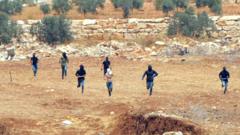The chilling attack on Brahim Hamaiel's farm by masked settlers highlights the escalating aggression against Palestinian agriculture in the occupied West Bank. Amid fears and confrontations, the community struggles to protect their ancestral lands against a backdrop of Israeli governmental support for illegal settlements.
Masked Settlers Attack Palestinian Farm in Occupied West Bank, Escalating Tensions

Masked Settlers Attack Palestinian Farm in Occupied West Bank, Escalating Tensions
A recent attack on olive farms in the West Bank, witnessed by BBC reporters, illustrates the rising violence and devastation faced by Palestinian farmers amid ongoing settler aggression.
In the occupied West Bank, a violent incident unfolded as masked settlers launched an unprovoked attack on a Palestinian farm, observed by BBC correspondent Lucy Williamson. The assault on Brahim Hamaiel's olive trees was marked by the swift approach of a group of settlers descending from an illegal outpost, brandishing large sticks. The destruction of the olive trees represents not only a personal loss for Hamaiel’s family, who have cultivated the land for generations, but also an ongoing assault on the very concept of Palestinian autonomy.
Hamaiel conveyed his determination to remain on the land despite the threats, stating, "Fear is natural... but there’s something stronger than fear that drives me to stay here." As the settlers advanced, local Palestinian residents gathered with stones and catapults in defense of their farms, an act of solidarity amidst a familiar scene of conflict that has become commonplace in the region.
The violence escalated rapidly, with settlers spreading across the hills, committing acts of arson against vehicles and homes. Alarmingly, the Israeli army, which has been criticized for not intervening effectively, blocked Palestinian volunteers who sought to assist affected residents and extinguish fires. The account from a volunteer underscored a troubling dynamic, as they stated, "We’re not here to attack or harm settlers... but the army stops us."
Data from advocacy group Peace Now demonstrates the alarming increase in settler attacks and illegal outposts since the recent conflict reignited in October 2023. Reports show that since the beginning of last year, approximately 100 new outposts have been established, contributing to widespread land seizures via intimidation and violence, often emboldened by governmental support.
The plight of farmers like Hamaiel is compounded by systemic violence; there are reports that 149 Palestinians have been killed in confrontations with Israeli settlers or soldiers this year. Tragically, one of the most recent casualties was 18-year-old Hamdan Abu-Elaya, killed by Israeli troops during a confrontational incident that drew public mourning.
Community members expressed their sorrow and frustration, with a bereaved father stating his resolve against the occupation, while local traditions of farewell displayed deep-rooted connections to the land. The ongoing cycle of violence and retaliation remains a significant barrier to peace, as each moment of grief for one community serves to strengthen the ties of another, further entrenching the complexities of conflict in the West Bank.
Hamaiel conveyed his determination to remain on the land despite the threats, stating, "Fear is natural... but there’s something stronger than fear that drives me to stay here." As the settlers advanced, local Palestinian residents gathered with stones and catapults in defense of their farms, an act of solidarity amidst a familiar scene of conflict that has become commonplace in the region.
The violence escalated rapidly, with settlers spreading across the hills, committing acts of arson against vehicles and homes. Alarmingly, the Israeli army, which has been criticized for not intervening effectively, blocked Palestinian volunteers who sought to assist affected residents and extinguish fires. The account from a volunteer underscored a troubling dynamic, as they stated, "We’re not here to attack or harm settlers... but the army stops us."
Data from advocacy group Peace Now demonstrates the alarming increase in settler attacks and illegal outposts since the recent conflict reignited in October 2023. Reports show that since the beginning of last year, approximately 100 new outposts have been established, contributing to widespread land seizures via intimidation and violence, often emboldened by governmental support.
The plight of farmers like Hamaiel is compounded by systemic violence; there are reports that 149 Palestinians have been killed in confrontations with Israeli settlers or soldiers this year. Tragically, one of the most recent casualties was 18-year-old Hamdan Abu-Elaya, killed by Israeli troops during a confrontational incident that drew public mourning.
Community members expressed their sorrow and frustration, with a bereaved father stating his resolve against the occupation, while local traditions of farewell displayed deep-rooted connections to the land. The ongoing cycle of violence and retaliation remains a significant barrier to peace, as each moment of grief for one community serves to strengthen the ties of another, further entrenching the complexities of conflict in the West Bank.






















